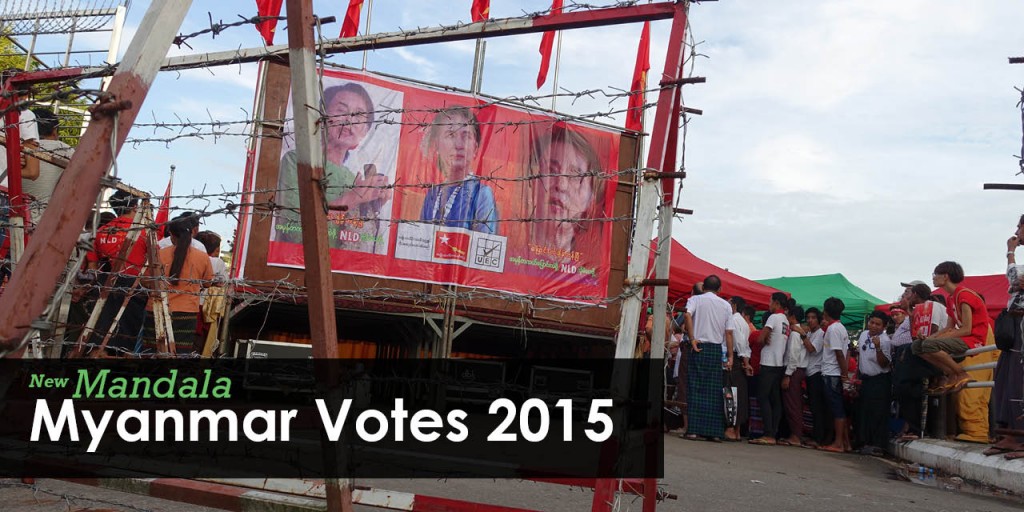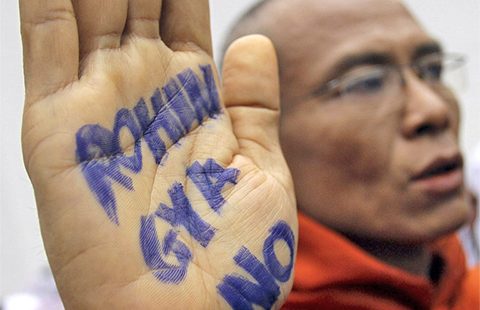
Religion has proved a thorny issue in Myanmar’s election campaign, being used to divide voters. Whoever wins on Sunday will need to carefully manage the issue for now on.
Religion is playing an increasingly important role in Myanmar’s domestic politics, including in this weekend’s elections.
Notably, the Association for the Protection of Race and Religion (Ma Ba Tha) has assumed a far more assertive, and political, role in recent months. Its behaviour has ranged from subtle hints about what it thinks is best for Myanmar, to blatant lobbying and propaganda efforts, while also occasionally directly telling people to vote for the ruling Union Solidarity and Development Party (USDP) and not the National League for Democracy (NLD).
This is a different position from its initial stance of being apolitical and has the potential to influence the outcome of the elections.
Ma Ba Tha’s main grievance is that it does not believe the NLD will protect race and religion, and quite possibly fears that it will try to reverse several controversial laws (which Ma Ba Tha influenced) if it attains a majority in parliament. As such, it is trying to make the elections about the protection of race and religion in Myanmar, while alleging that the NLD does not want (or cannot ensure) this.
NLD has managed to avoid taking the bait on these issues, but there are signs it may still be influenced by this. For example, some suggest NLD’s decision to not select any Muslim candidates was a political move to, in part, appease Ma Ba Tha while also appealing to the broader Buddhist supporter base.
But Ma Ba Tha isn’t the only group playing the protection of race and religion card.
So far, on several occasions, USDP officials have also adopted this line, with comments ranging from subtle references to the need to protect race and religion (and it being the only party capable of achieving this) to derogatory remarks directed at Aung San Suu Kyi and the NLD.
Most recently, the Commander-in-Chief, Min Aung Hlaing, also echoed this sentiment when he told an audience of ranking officers in the Naypyitaw Command that they should vote for a candidate who can ‘protect race and religion’. Without naming any particular party, it is clear that he was not suggesting they vote for the NLD.
This is quite significant and, as Derek Tonkin noted on Network Myanmar, is a distinct departure from comments by the then Senior General Saw Maung in 1990 regarding the elections that year.
Together, Ma Ba Tha and the Tatmadaw, Myanmar’s armed forces, should have some influence over certain voters. Ma Ba Tha has demonstrated an ability to influence large groups of, while exploiting the role of Buddhism in Myanmar society to enhance this influence. And the Tatmadaw is still arguably the most powerful institution in Myanmar.
But is it really likely to have an impact on Sunday?
So far, there have been anecdotal and media reports suggesting that NLD campaigners have had a difficult time due to Ma Ba Tha’s lobbying, but there are also indications that, despite Ma Ba Tha’s influence, it won’t affect how NLD’s support base will vote on the day.
Ultimately, Ma Ba Tha is effectively gambling on there being more people willing to believe its rhetoric on ‘race and religion’ and put this ahead of a desire to see the NLD elected to parliament.
But even if most people can’t see Ma Ba Tha’s scaremongering for what it is, NLD still represents something much larger – change. And the bigger question of whether it actually can achieve genuine change if it wins a majority in parliament is almost irrelevant in this context.
The NLD is currently the only major alternative that many people have and it is likely seen as their best chance of distancing the next government that forms from the previous decades of military rule.
By aligning itself with the USDP and espousing this rhetoric, Ma Ba Tha is putting voters in an ‘us versus them’ position, where it seemingly wants people to choose between protecting race and religion and the NLD with its potential for broader change, as though they are mutually exclusive.
But in doing so, it is risking a significant loss of face and credibility if the majority of the vote goes to the NLD.
After all, voting NLD in would signal that the “people”, most of whom are Buddhist, have chosen to support NLD over the USDP and, by extension, Ma Ba Tha. And such an outcome might suggest that Ma Ba Tha’s continued influence over the government would be minimal.
But even if the NLD achieves a strong outcome, religion is likely to continue to be an important issue in Myanmar politics and one that all parties will need to carefully manage.
Rhys Thompson is a director of Hermitage Research, a strategic risk consultancy based in Myanmar. He has worked in both official government and private sector capacities in Myanmar since 2010, first with Australia’s Department of Foreign Affairs and Trade, where he was posted as a diplomat to the Australian Embassy in Yangon from 2010 until late 2013.
This article forms part of New Mandala’s ‘Myanmar and the vote‘ series.
 Facebook
Facebook  Twitter
Twitter  Soundcloud
Soundcloud  Youtube
Youtube  Rss
Rss 